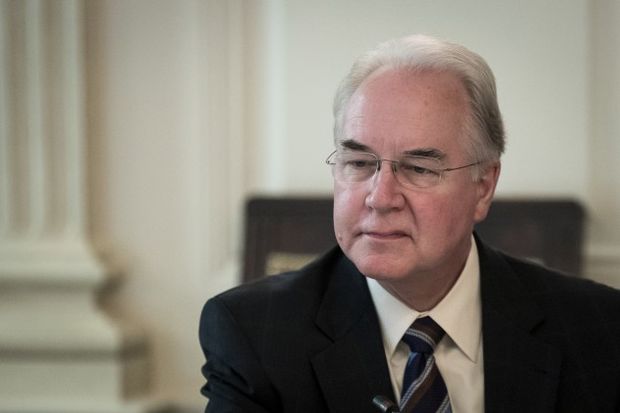Trump’s Ex-HHS Chief Seeks Career Rehab With Old Campaign Cash
- Former congressman, HHS head asks FEC to approve money shift
- Democratic chairwoman questions personal use of campaign cash
Former congressman and HHS Secretary Tom Price is asking federal regulators to let him become the first former officeholder to shift leftover campaign cash to a nonprofit intended to promote his policy ideas and possibly revive a political career derailed by scandal.
Price’s plan to tap $1.7 million from his campaign account has the Federal Election Commission divided over whether the proposal would create a loophole in campaign finance law, which bars personal use of such funds.
The proposal would establish “a new blueprint for federal politicians to rehabilitate their reputations after a scandal using other people’s money—specifically, using past electoral contributors’ money,” said election attorney Paul S. Ryan, vice president for policy and litigation at the watchdog group Common Cause.
Price, a physician, was re-elected to his House seat in 2016 before being selected by President Donald Trump to head the Health and Human Services Department. He left HHS after reports about his use of government funds to pay for unnecessary air charter and military flights.
Price’s proposed nonprofit would be focused on health care policy, according to his lawyer, Stefan Passantino. Price was a leading critic of the Affordable Care Act, which put him at odds with congressional Democrats.

The FEC has been trying to crack down on campaign committees — sometimes called zombie campaigns — that were established by candidates who’ve stopped running for office. Price’s committee hasn’t yet been targeted for closure because the commission has focused so far on ex-candidates who haven’t run for at least four years.
Zombie Campaigns Tell Election Regulators to Drop Dead
Commission Chairwoman Ellen Weintraub (D) questioned Price’s proposal, saying the FEC has never before let a living former lawmaker use campaign money to set up a tax exempt social welfare organization governed by Section 501(c)(4) of the tax code.
Jump-Starting Career
Under that IRS designation, the Price’s organization would be allowed to raise additional funds and wouldn’t be required to disclose its contributors.
“I view it as an expansion of the personal use exemption,” Weintraub said at a July 25 FEC meeting.
Weintraub’s opposition would sink Price’s plan since unanimous approval is required on the four member commission, equally divided between the parties.
A proposed ruling drafted by FEC staff would approve Price’s plan to transfer money from his dormant House campaign committee to jump-start his new policy group. Weintraub said she could consider a redrafted ruling addressing her objections but wouldn’t commit to voting to approve Price’s plan. A vote on a revised proposal could come at the FEC’s next scheduled meeting Aug. 22.
The two Republican commissioners, Matthew Petersen and Caroline Hunter, said the Price request was in line with previous rulings and should be approved.
Petersen, the FEC vice chairman, said Price’s plans to use campaign money to promote his policy views clearly did not represent illegal personal use of campaign money under commission precedents, which have focused on preventing payments of purely personal expenses.
If it’s impermissible for Price to use campaign funds in the way he’s proposed, “then its also impermissible for those others who’ve made similar requests” previously approved by the commission, Petersen said.
Dead Man’s Money
Weintraub distinguished the Price request from an earlier FEC ruling in 2012 in favor of the campaign committee of former Rep. Tom Lantos (D-CalIf.) using funds for his human rights group. She said the group couldn’t provide a personal benefit because Lantos was dead.
A rejection of Price’s proposal would hamper his efforts to jump start a political career marred by the travel scandal. An HHS inspector general’s report said the department should consider recouping $341,000 of taxpayer money wasted on Price’s travel, but this amount apparently has never been repaid. Price voluntarily paid the government nearly $60,000 when he left HHS, maintaining that this represented his portion on the questioned travel costs.
Price has laid low since leaving HHS but was named last year to a transition team advising Georgia’s new Republican Gov. Brian Kemp. Kemp, who had been the state’s top election official, won a close 2018 election for governor over Democrat Stacy Abrams. Abrams charged that the election was marred by suppression of minority voters.
Weintraub’s opposition to Price’s plan could affect how candidates from both parties are able to use campaign money. For example, former Sen. Heidi Heitkamp (D-N.D.) recently donated $750,000 to a newly formed nonprofit policy group called One Country Inc.
That move was first reported by the Center for Public Integrity, a nonprofit news organization.
To contact the reporter on this story: Kenneth P. Doyle in Washington at kdoyle@bgov.com
To contact the editor responsible for this story: Bennett Roth at broth@bgov.com